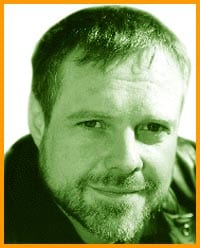The big buzz in sexual theory these days is the idea that gay is no more, that we’ve mainstreamed ourselves into one big horny human race.
Credit (or blame) for kick-starting much of this falls at the feet of
Toronto’s Bert Archer, a chrome-domed 29-year-old with a quick mind and freshly-pressed pants whose book The End Of Gay has made quite a splash.
Bert’s biggest problem, it seems, is getting the people who comment on his book to read and digest it.
Take Sky Gilbert, who, by the way, I absolutely adore. He pronounced in the Toronto Star that he “really hates this book.” Though this might have been before he actually read it, because in Sky’s latest article in This Magazine, he pretty much agrees with Bert’s central idea, proposing that by 2050, perhaps, gay will cease to be. For him, we’re not exactly at the end of gay, more like at the twilight of gay.
Intrigued, I was interested in a Mar 1 panel discussion, which would include Sky and Bert, sponsored by This Magazine, under the title “Is Gay Passé?”
It turned out to be an embarrassing travesty, where a beleaguered Sky was forced to defend himself for the apparent sin of being a white male, plaintively crying out “But I’m a drag queen!” 45 minutes into the evening.
York University professor Rinaldo Walcott, an engaging panelist of Jamaican descent, and – I found out later – gay, earned huge laughs and applause from the mostly white middle-class audience when he began by asking why anyone should care about a couple of middle class white boys – Bert and Sky – having a crisis of identity. This set the tone; the debate was derailed from the top. It was all about race, marginalization and class, not about “Is Gay Passé?”
The fourth panelist, TJ Bryan, a dyke of colour, emphasized that for her race is more important than sexual identity. She was loud and rude, and not always in a good way. She pointed out she hadn’t read Bert’s book, and sneered at TV’s Ellen with her “lily white skin,” in a way that was really unpleasant, because it was racist. But the audience seemed to eat it up. I’m not sure why. Perhaps they were being patronizing, or perhaps, in that grand tradition of the political left, they enjoyed paying money to be insulted. I suspect the latter.
(Poor Ellen can’t get a break. When she went political, she lost her TV show, and now the politicos hate her more. We’re left with Will And Grace).
The fact is, with The End Of Gay, Bert has proposed something very
intriguing, maybe even something very important – a new frontier of sexual liberation. His idea is utopian, and a bit irresistible: that we can get past sexual identities and just love whomever we want to love. The End Of Gay draws on solid historical precedent to fashion an entirely new idea. It might very well be an evolutionary step in human consciousness, which we are privileged to witness from birth. It is certainly worth debating.


 Why you can trust Xtra
Why you can trust Xtra


